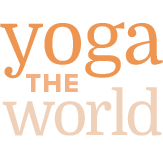Ahimsa (or non-injury). And war
This Saturday, as I emerged from an underground Subway station, I walked right into a protest.
“Violence is justified,” the crowd chanted.
I felt dizzy. I thought of a speech I heard, more than a decade ago, from a seasoned war correspondent to young military cadets. “No matter how just you think a war is,” he said, “you can never forget that all wars are asking you to kill humans and destroy things.”
Yogic philosophy sets Ahimsa, non-violence or non-injury, as one of the five Yamas. Yamas are self-restraints, things we don’t do so that we can be in right relationship with each other.
(Ahimsa is probably the most cited of the five Yamas, the other ones being Satya (non-lying), Asteya (non-stealing), Brachmacharya (non-excess), and Aparigraha (non-possessiveness)).
In the context of social justice and overcoming oppression, Ahimsa is about more than not injuring another being’s physical and mental integrity (though it is surely that). In her brilliant pamphlet, White Ally, Sonia Roberts describes the connection between Ahimsa and oppression:
“Ahimsa … guides you to understand the power and privilege you possess or lack ... Be sensitive to the fact that people are getting hurt, and just because it may not be happening to you directly, doesn’t mean it’s not happening. Are you complicit in the suffering of the world?”
I am writing this as I look out my window on a Sunday-quiet park, and I feel my privilege deeply. There is no “but.” No one can know what war and occupation feel like until they are living it. I know this.
And right now, I also know that I am feeling deep despair, anger, and loss. These feelings have weight and value. They must have. They have to be my guide, even as I know they reside in and arise from my privilege.
They are all I have, in any case.

